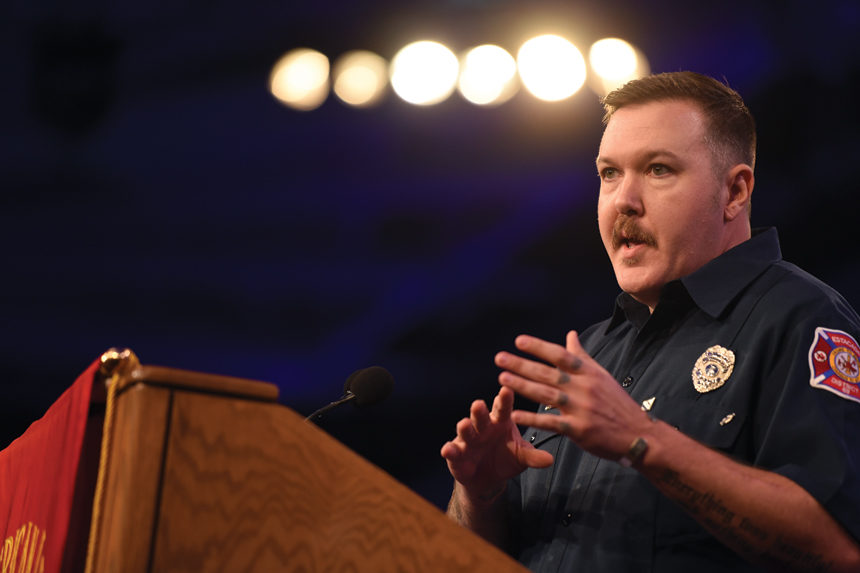Smoke and flames billowed through the windows of the Baghdad home. U.S. Army Corporal Damon Faust’s unit was on patrol, and as they reached the burning building, they suddenly realized: People were trapped inside. Faust grabbed a fire extinguisher and charged into the two-story home. He was still loaded with body armor, magazines, and ammunition; his M203 grenade launcher hung over his shoulder. Propane tanks sat ominously in the entryway.
“An Iraqi gentleman started pointing where the flames were,” Faust says. “I didn’t speak the language, but I knew he was trying to tell me something. So I’m following him, making a path with the extinguisher, and I can’t see anything. And he picks up this kid, a young boy, and he hands the boy to me, and we make our way out of the building.”
The boy was badly burned. Faust delivered him to the platoon’s medic, SPC “Doc” Murillo, and raced back into the building. He soon carried out an elderly woman who was burned worse than the boy. Doc Murillo treated their wounds and the two were whisked away in an ambulance.
“From that day on,” says Murillo, “I looked at Damon Faust different.”
Faust was awarded the U.S. Army Soldier’s Medal for heroism, and firefighting would become his future. In 2016, 11 years after his actions in Baghdad, Faust joined the Estacada Rural Fire District 69 in Oregon, and the American Legion named him Firefighter of the Year in August 2018. He plays a leading role in Estacada’s Veterans to Firefighters program, which helps soldiers enter the fire service, providing them with camaraderie, direction, and teamwork.
“The goal is to help repurpose veterans, put them with mentors, and show them that there are other ways to serve,” says the 40-year-old Faust.
A desire to serve led Faust to the Army in 2000. Raised by a single mom, he was a rebellious teenager who eventually dropped out of high school. “I didn’t have many male role models,” he says. “A lot of the guys I grew up with ended up in jail or addicted or dead. I was a pretty rotten teenager, and I wanted to do something good. I wanted to make amends for how I treated my mother.”
Faust served in Germany for three years and then joined a National Guard infantry unit in California. He was working at a post office when the Iraq war began in 2003.
“I’m sitting at home playing a Call of Duty-type game and I get a call from my platoon sergeant, who’s now a recruiter,” Faust recalls. “He said, ‘Hey, Damon, Charlie Company is going to Iraq,’ and I said, ‘Not without me.’”
“I definitely live with my time in Iraq. It definitely goes to sleep with me and wakes up with me some mornings.”
For nine months, Faust’s unit patrolled Baghdad’s notorious Sector 26. He was involved in numerous skirmishes, including a March 2005 truck bomb attack on the Al-Sadeer Hotel that killed three people and wounded more than 40.
Faust was hit multiple times by IEDs, though his injuries could have been worse. Militants often forced farmers and shop owners to bury IEDs, but citizens frequently placed the bombs deep in the ground or far from the road.
“I think I got hit more by those weaker IEDs,” he says. “And then I had two major ones that rattled my noggin pretty good.”
Faust has since been diagnosed with post-traumatic stress disorder (PTSD) and traumatic brain injury. “I definitely live with my time in Iraq,” he says. “It definitely goes to sleep with me and wakes up with me some mornings. Some days are better than others.”
When he returned from his one-year tour in Iraq, he went to community college and then Oregon State University. But his combat experiences plagued him. He began seeing a counselor and spent three months in California receiving inpatient care for PTSD. “I started to build tools to identify my triggers and my red flags,” he says.
Faust still wanted to serve others. Some of his best memories from Baghdad were working at first-aid stations and an Iraqi election. “The folks holding up their little black fingers [inked to indicate they’d voted], they were stoked, and you could see it on their faces,” he says. “Those humanitarian-type missions, where we weren’t kicking in doors — I felt a great sense of pride.”
Faust eventually served with Team Rubicon, a disaster relief organization staffed mainly by volunteers, most of whom were veterans. He worked in New Jersey after Hurricane Sandy, cleaning out houses and moving debris, and later volunteered in Haiti and the Philippines. While working in Oklahoma after 2013’s Moore tornado, he met a mentor, Terry Rivera, a retired New York City firefighter. “Damon is a deep soul,” Rivera says. “Every task I asked of him he accomplished, and we spoke a lot about my time in the FDNY on and after 9/11.”
Faust felt a bond with firefighters like Rivera. He earned his degree from OSU, and with the help of the Veterans Administration, he obtained his wildland firefighter certification.
After initially doing seasonal work, he joined the Estacada fire department full-time. Faust soon became involved with the Veterans to Firefighters program and met with the department’s division chief, Richard Anderson, to learn about ways the program could support more veterans. But unbeknownst to Anderson, Faust was already providing support. For several months, he’d been driving one of the program’s new recruits to his appointments at the VA hospital.
“It was impressive to see that level of dedication and compassion,” says Anderson, who’s working with Faust to raise funds for the program. “He hadn’t even told us he was doing it. It was just something he was doing out of the kindness of his heart.” Faust now does such work on duty, guiding veterans through the VA process.
Firefighting isn’t the right fit for every veteran, says Faust. For some, the flames trigger combat memories. But frequently, as with him, it provides a sense of purpose. He’ll always have some degree of PTSD, but these days life seems good.
Faust cherishes his long-time partner, Shauna, who stuck with him during his darkest battles with PTSD, and his two daughters from a previous marriage. In 2018, he was the grand marshal for Estacada’s Fourth of July parade. And yes, he’s made amends with his mother, who often worried about him — but also believed in him. “She has no doubt that if I say I’m going to do something that it will happen,” he says. “And she’s right most of the time.”
Ken Budd is the author of The Voluntourist and the host of 650,000 Hours, an upcoming web series on travel and real-life American heroes.
This article is featured in the March/April 2019 issue of The Saturday Evening Post. Subscribe to the magazine for more art, inspiring stories, fiction, humor, and features from our archives.
Featured image credit: Lucas Carter/The American Legion
Become a Saturday Evening Post member and enjoy unlimited access. Subscribe now



